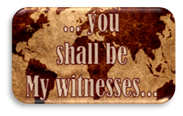
The Gospel we hear proclaimed today, and the first reading taken from the Acts of the Apostles, are like the conclusion of Part 1 and the beginning of Part II of Luke’s story. We know that Luke wrote both the Gospel attributed to him and the Acts of the Apostles. Throughout the liturgical year, the only time we hear from Acts in our Sunday liturgy is during the Easter season when it replaces the Hebrew Scriptures (Old Testament) as the first reading. It is the fledgling Church which takes centre stage after the Resurrection. We journey with these disciples as they struggle to deepen their understanding of the task with which they have been charged, told in Matthew’s Gospel as: “Go and make disciples of all nations.”
Here in Acts, Luke is remembering for us those days following Christ’s resurrection when he appeared to those closest to him. The reading ends with the men “gazing up toward heaven,” understandable given the circumstances. Yet as they are staring “two men in white robes” show up. Are these the same two who appeared to the women outside the tomb when they went to anoint Jesus’ body following his crucifixion? We aren’t told. But the men in white appear almost to chastise the apostles to get about their business: “Why do you stand looking up toward heaven?” A lot has happened in the days leading up to and following Jesus’ death and resurrection. One can accept that these fishermen may be feeling a little overwhelmed.
Jesus has told them they are to be his “witnesses” – a word used in both the first reading and the Gospel. What does a witness do? According to Wikipedia “A witness is someone who has, who claims to have, or is thought, by someone with authority to compel testimony, to have knowledge relevant to an event or other matter of interest.” The resurrection of Jesus could be noted as a ‘matter of interest.’
In the Gospel, Jesus tells the apostles that they are witnesses to his suffering, resurrection, and proclamation of repentance and forgiveness. In Acts, they are told they will be his witnesses “to the ends of the earth,” and the power they needed to do that witnessing will be given to them. The stories we have heard from Acts over these weeks since Easter Sunday give us details about how the apostles attempt to be the witnesses whom Jesus has told them they are.
Now, 2000 years since Jesus left them this responsibility, their message has spread throughout the world. By any standard they have done well in providing ‘testimony’ of this ‘matter of interest.’ As their descendants in faith, we too are charged with the same task. How do we witness to the message? According to St. Francis of Assisi we must preach the Gospel always … using words only when necessary. Clearly, our actions need to reflect our belief in what Luke wrote so long ago. This belief comes through our own experiences of this truth, often hard to articulate, but evidenced to us all the same.
Ellen Bennett
Office of Faith Development, Archdiocese of Moncton
MAY
2019

About the Author: